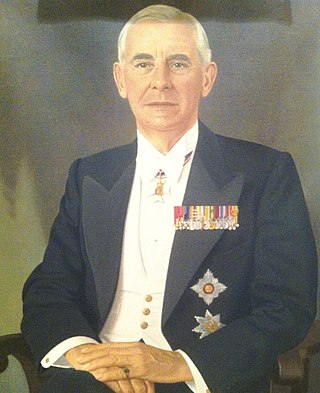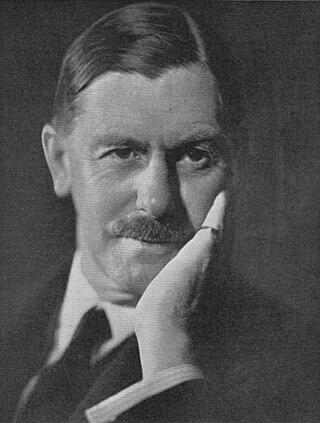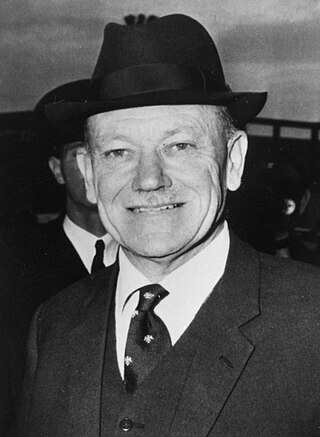Related Research Articles

Sir Roland "Roy" Welensky was a Northern Rhodesian politician and the second and last Prime Minister of the Federation of Rhodesia and Nyasaland.

John James Wrathall, was a British-born Rhodesian politician. He was the last white President of Rhodesia. He formerly worked as a chartered accountant.

Sir Edgar Cuthbert Fremantle Whitehead, was a Rhodesian politician and statesman who served as Prime Minister of Southern Rhodesia from 1958 to 1962. He had a long and varied political career, serving as a longstanding member of the Southern Rhodesian Legislative Assembly and in a variety of minister posts over the course of nearly three decades. simultaneously serving in a variety of government position posts. His work was frequently interrupted by recurring health problems; he suffered from poor eyesight and later experienced deafness whilst in office. An ally of Sir Roy Welensky, he was Prime Minister of Southern Rhodesia from 1958 to 1962. His government was defeated in the 1962 general election by the Rhodesian Front.
George Mitchell served as Prime Minister of Southern Rhodesia from July to September 1933.

Elections in Southern Rhodesia were used from 1899 to 1923 to elect part of the Legislative Council and from 1924 to elect the whole of the Legislative Assembly which governed the colony. Since the granting of self-government in 1923, Southern Rhodesia used the Westminster parliamentary system as its basis of government. The Political party that had most of the seats in the Legislative Assembly became the government. The person in charge of this bloc was the Premier, later renamed Prime Minister, who then chose his cabinet from his elected colleagues.

The Rhodesia Labour Party was a political party which existed in Southern Rhodesia from 1923 until the 1950s. Originally formed on the model of the British Labour Party from trade unions and being especially dominated by railway workers, it formed the main opposition party from 1934 to 1946. The party suffered a catastrophic split during the Second World War and lost all its seats, and a further split over the attitude to the Federation of Rhodesia and Nyasaland ended its involvement in Rhodesian politics.
General elections were held in Southern Rhodesia on 25 April 1946, seven years after the previous elections in 1939, the term of the Southern Rhodesian Legislative Assembly having been extended so that there would be no general elections during World War II. The elections showed a strong shift to the right, as the United Party government led by Prime Minister Godfrey Huggins lost its overall majority; however, Huggins could count on the support of one of the factions of the Rhodesia Labour Party in any vote of confidence and therefore remained in office.
General elections were held in Southern Rhodesia on 15 September 1948. They saw Prime Minister Godfrey Huggins regain the overall majority he had lost in the previous elections in 1946. Huggins' United Party won a landslide, reducing the opposition Liberal Party to a small minority.
Sir Robert Clarkson Tredgold, KCMG, PC, was a Rhodesian barrister, judge and politician.

John Wallace Downie served as High Commissioner of Southern Rhodesia from 1930 to 1935.
The Responsible Government Association (RGA), called the Rhodesia Party from 1923, was a political party in Southern Rhodesia. Founded in 1917, it initially advocated responsible government for Southern Rhodesia within the British Empire, as opposed to incorporation into the Union of South Africa. When responsible government was achieved in 1923, the party became the governing Rhodesia Party. It endured until 1934, when it merged with the right wing of the Reform Party to create the United Party, which remained in power for 28 years afterwards, and was itself defunct by 1965.

Sir Ernest Lucas Guest was a Rhodesian politician, lawyer and soldier. He held senior ministerial positions in the government, most notably as Minister for Air during the Second World War.

The modern political history of Zimbabwe starts with the arrival of white people to what was dubbed Southern Rhodesia in the 1890s. The country was initially run by an administrator appointed by the British South Africa Company. The prime ministerial role was first created in October 1923, when the country achieved responsible government, with Sir Charles Coghlan as its first Premier. The third premier, George Mitchell, renamed the post prime minister in 1933.
Major Sir Robert James Hudson,, was twice acting Governor of Southern Rhodesia.

Godfrey Martin Huggins, 1st Viscount Malvern, was a Rhodesian politician and physician. He served as the fourth Prime Minister of Southern Rhodesia from 1933 to 1953 and remained in office as the first prime minister of the Federation of Rhodesia and Nyasaland until October 1956, becoming the longest serving prime minister in British Commonwealth history, until 1961.

Sir Thomas Hugh William Beadle, was a Rhodesian lawyer, politician and judge who served as Chief Justice of Southern Rhodesia from March 1961 to November 1965, and as Chief Justice of Rhodesia from November 1965 until April 1977. He came to international prominence against the backdrop of Rhodesia's Unilateral Declaration of Independence (UDI) from Britain in November 1965, upon which he initially stood by the British Governor Sir Humphrey Gibbs as an adviser; he then provoked acrimony in British government circles by declaring Ian Smith's post-UDI administration legal in 1968.
The Reform Party was a political party that was formed in Southern Rhodesia in 1932, which went on to form the government under Godfrey Huggins in 1933, before splitting in 1934 and disappearing by the end of the decade. The party had support from disenchanted Rhodesian settlers including "railway men, civil servants, artisans without a job and farmers in economic distress." Its initial program proposed the creation of a central bank to regulate the colony's currency and credit and other measures to provide economic support for white workers and farmers facing competition from low paid African workers and manufacturers facing competition from cheaper South African imports.

The Leader of the Opposition in Southern Rhodesia and Rhodesia was a title held by the leader of the largest political party in the most important house of the legislature that was not in government.
Jacob Hendrik Smit, CMG was a Southern Rhodesian merchant and politician. Born in the Netherlands, Smit migrated to Rhodesia and traded as a merchant, before becoming Southern Rhodesia's Minister of Finance in 1933. Orthodox in his economic policies, Smit resigned from Godfrey Huggins' government in 1942 and later formed the right-wing Liberal Party. He was Southern Rhodesia's Leader of the Opposition from 1946 to 1948, when he lost his seat.
Albert Rubidge Washington Stumbles, was a Southern Rhodesian lawyer and politician. After serving as a minister under Garfield Todd and Edgar Whitehead, Stumbles became the Speaker of the Legislative Assembly of Southern Rhodesia in 1964, a post he held until 1972. As Speaker, Stumbles is best remembered for his acceptance of Southern Rhodesia's Unilateral Declaration of Independence in 1965.
References
- 1 2 3 "Obituary: Mr H H Davies". East Africa and Rhodesia. 34. London: Africana: 18. 1957.
- 1 2 3 Roberts, R S (1972). Rhodesian History: The Journal of the Central African Historical Association. Vol. 8. Salisbury: Central Africa Historical Association. p. 59.
- 1 2 3 Willson, F M G, ed. (1963). Source Book of Parliamentary Elections and Referenda in Southern Rhodesia, 1898–1962. Salisbury: Department of Government, University College of Rhodesia and Nyasaland. p. 225. OCLC 219295658.
- ↑ Blake, Robert (1977). A History of Rhodesia (First ed.). London: Eyre Methuen. pp. 235–237. ISBN 978-0-413-28350-4.